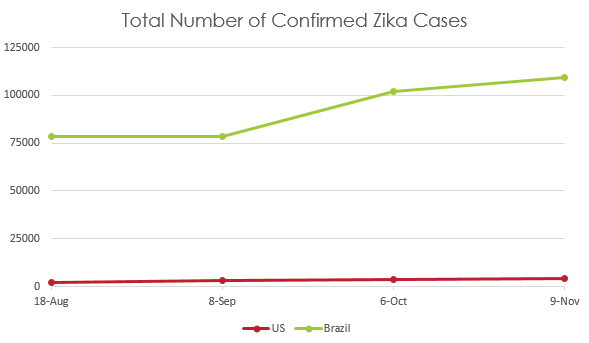As of October 19, 2016, there were 4,016 cases of Zika in the continental US. Of these cases, 137 were acquired in the US, and the remaining 3,878 cases were acquired in other countries[1]. Despite the low prevalence, Zika has gained wide media coverage across the US and is seen as a significant threat to many.
Here at BuzzBack, we were interested to find out what residents in the US and Brazil understood with regards to symptoms, transmission and prevention of Zika. According to our study, when asked to select the most severe among a list of outbreaks/pandemics, Zika was a close second to HIV/AIDS, selected by 20% (HIV/AIDS was selected by 24%). This may be surprising, given that HIV/AIDS impacts millions of people in the US[2].
Brazil, on the other hand, has faced far more Zika cases than in the US – over 90,000 new cases reported from January to April 2016 alone[3]. When asked to identify the most severe outbreak/pandemic, 24% listed Zika as their top concern (similar to that of the US) – whereas 44% indicate HIV/AIDS as the most severe.

Data collected from PAHO & WHO: http://www.paho.org/hq/index.php?option=com_content&view=article&id=12390&Itemid=42090&lang=en
While it is not surprising that Zika is particularly top of mind and viewed as relevant at the moment, what is surprising is that (1) the concern in the US appears to be comparable to that of HIV/AIDS – despite having FAR less of an impact and (2) the general concern in the US appears to be comparable to that of Brazil – despite vast prevalence.
By utilizing BuzzBack’s eCollage (a non-lexical, indirect format to reveal personal feelings, using images as metaphors to reduce dependency on rational thoughts), the drivers of concern in the US are identified. The key source of fear in the US is the unknown. Individuals know there is a lot of information on Zika, but they are unsure of what is true or false. They worry about how much the virus will spread, and fear they will not see it coming or would not know they're infected until it is too late. Not understanding the disease fuels fear – Are there clear signs of infection? Can it be stopped? Is there a cure?
Does Zika warrant this grave concern? Or is this more of a reflection of people in the US being impacted by heavy media coverage? Will the media ultimately help give individuals a greater understanding of what Zika is all about? Are there certain organizations (e.g. CDC, WHO) who can help clarify concerns about Zika? Only time will tell…
If this topic interests you, head over to watch our latest webinar which features more insights from our Zika study.
[1] http://www.cdc.gov/zika/geo/united-states.html
[2] In 2014, 44,073 people were newly diagnosed with HIV infection in the United States; in 2012, 1,218,400 people were reported living in the US with HIV; and in 2013 there were an estimated 12,963 HIV/AIDS-related deaths. http://www.cdc.gov/hiv/statistics/overview/ataglance.html
[3] http://www.rte.ie/news/2016/0427/784704-brazil-zika/